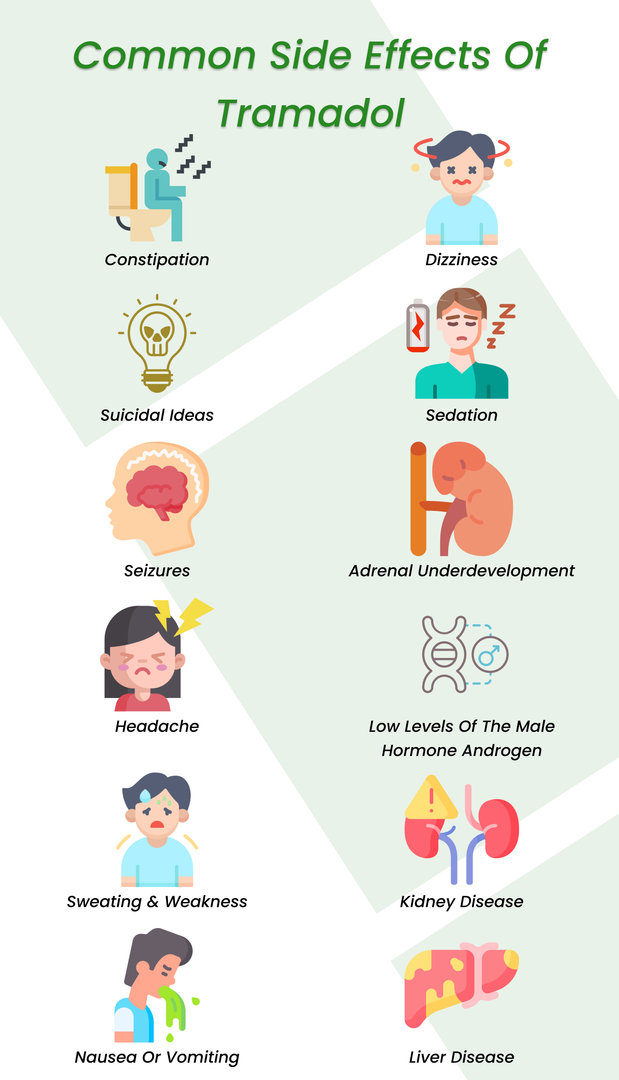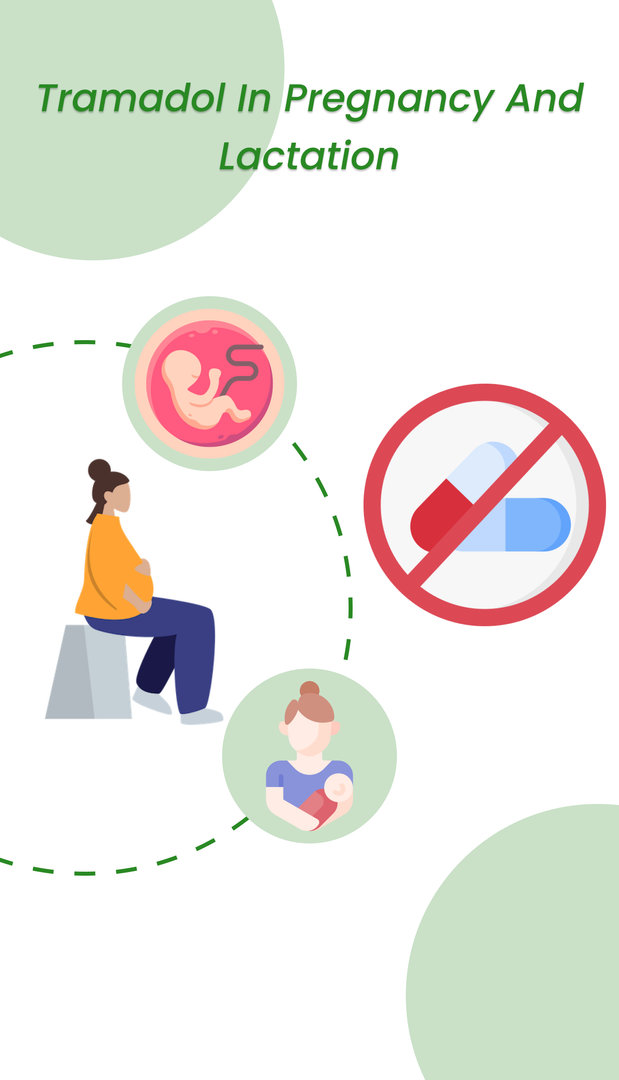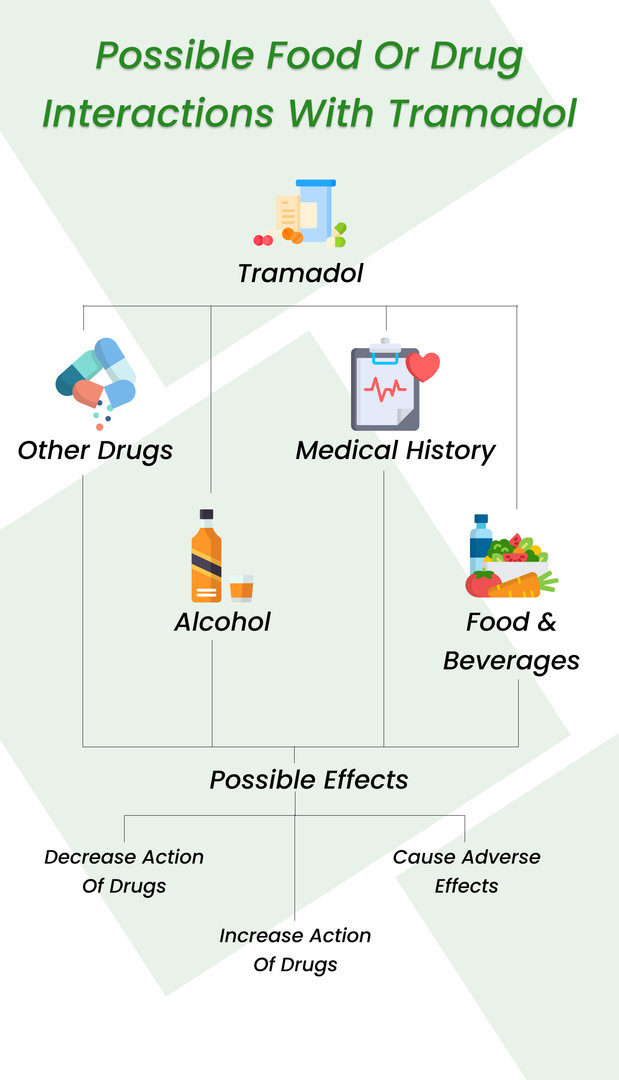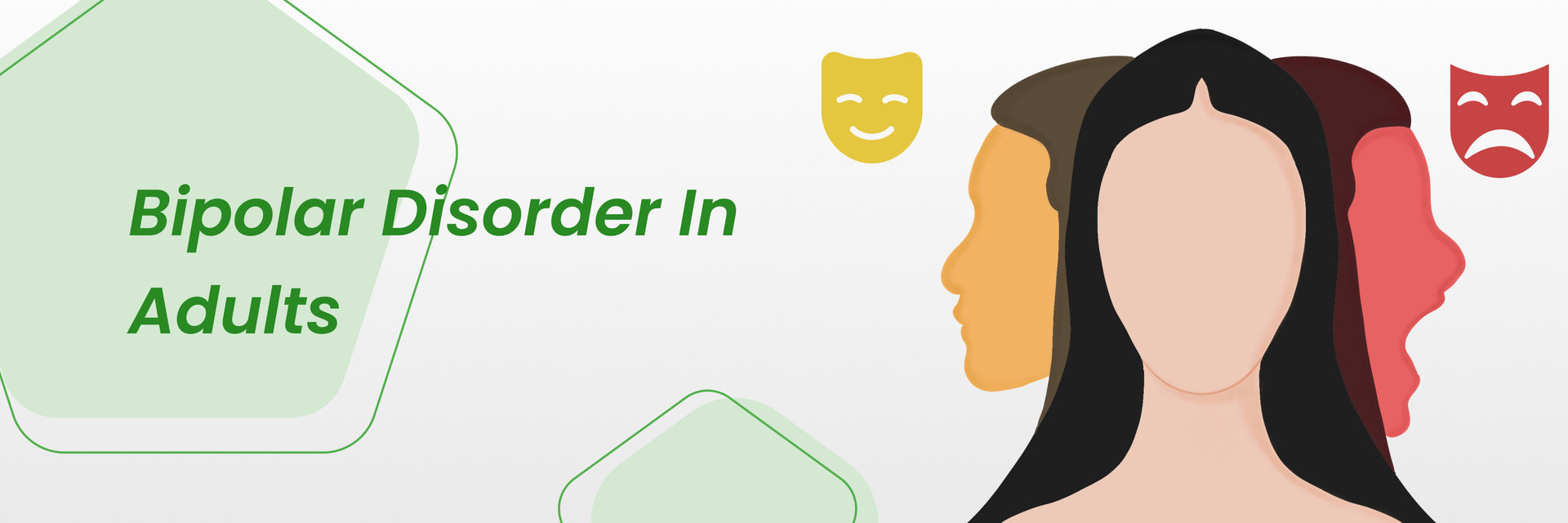Overview
Ever thought a painkiller could also help with anxiety or depression?
Tramadol, which became available in 1995, is primarily known for its power to relieve moderate to severe pain and even migraines. But here's where it gets interesting, beyond its role as an opioid analgesic, Tramadol's effect on neurotransmitters like serotonin and norepinephrine gives it a unique off-label potential for treating mood disorders. A survey revealed that 94.6% of users felt it was an effective antidepressant in low doses.
So, why the buzz?
Tramadol blocks pain signals in the central nervous system (CNS), leading to temporary feelings of relaxation and reduced anxiety. However, this is where caution comes in.
Dr. Vikas Patel, a well-known psychiatrist, emphasizes, "While Tramadol can influence mood due to its action on neurotransmitters, its primary purpose is pain relief. Using it for anxiety and depression is not well-established and can be risky, with potential for dependency and side effects."
What is Tramadol Used For?
Tramadol is a versatile pain reliever often compared to other opioids like codeine, hydrocodone, and morphine. It works by binding to opioid receptors in the brain, which blocks the transmission of pain signals and alters the brain's perception of pain.
Uses of Tramadol:
- Pain Relief: Tramadol is primarily used to relieve moderate to severe pain temporarily. It effectively blocks pain signals from the nerves in the central nervous system to the brain.
- When to Use: It should be considered only when non-opioid pain relief methods are ineffective or intolerable. It's not typically recommended for treating acute or chronic pain on a long-term basis.
Comparisons with Other Opioids:
- Similar to Codeine and Morphine: Like codeine and morphine, Tramadol is an opioid that provides pain relief by acting on the brain’s pain receptors. However, it is generally considered less potent than morphine but stronger than codeine.
- Quick-Acting and Effective: At low therapeutic doses, Tramadol can be a safe and effective option for managing pain and, in some cases, symptoms of depression and anxiety, particularly when there are no interactions with other medications.
After reading this, you must have the following question,
Can Tramadol treat anxiety?
Tramadol is effective in reducing symptoms of anxiety and depression, with few reported side effects. Tramadol is also prescribed as a preventive treatment for chronic neuropathic pain conditions. Tramadol may be beneficial for individuals dealing with anxiety and depression related to smoking cessation.
Neuropathic pain is caused by damage to the nerves in the body. It does not cure these conditions but can provide significant relief from the symptoms of stress and depression.
According to patient reports and a review of the biological literature, adult patients found Tramadol to be a usually safe, effective, and faster medication for relief from depression at low therapeutic doses without interactions with other medicines.
Please note: Using painkillers to relieve anxiety without a doctor's direction would probably cause more problems because it will not address the underlying causes.
Have you ever heard that intake of Tramadol keeps you at ease? Let's see!
Does Tramadol keep you calm and awake?
Tramadol has addictive properties despite not being as potent as each other. You can feel calm and relaxed. However, it can cause you Insomnia. Tramadol interferes with a person's regular sleep patterns (even if it is prescribed) by making it more likely for them to fall asleep during the day and stay awake at night.
Read on to learn more about this drug and its effectiveness against anxiety & depression.
How Does Tramadol Work Against Depression and Anxiety?
- Tramadol is an opioid that helps increase the serotonin level in the brain. The increase in serotonin helps in the regulation of mood and anxiety reduction.
- Tramadol also helps reduce the stress hormone cortisol and is, therefore, helpful in managing anxiety.
It's essential to consult a top psychiatrist to discuss safe and effective treatment options tailored to your specific needs.
Understanding Tramadol: Efficacy, Types, and Risks
Tramadol is a versatile pain reliever that typically starts working within an hour of ingestion. It’s designed to tackle moderate to severe pain and has applications beyond just pain relief, including the potential off-label use for anxiety and depression.
Types of Tramadol Tablets
Tramadol comes in two primary forms: fast-acting and slow-release. Each type is suited for different pain management needs.
| Type of Tramadol | Starts Working | Effects Last |
|---|---|---|
| Fast-acting Tramadol | Within 30 minutes to 1 hour | Up to 6 hours |
| Slow-release Tramadol | Within 2 to 3 hours | Up to 24 hours |
Tramadol for Anxiety and Depression
Tramadol can reduce symptoms of anxiety and depression within 30 to 60 minutes after intake. Its effects can last 6 to 24 hours, depending on whether a fast-acting or slow-release formulation is used. While these properties make Tramadol appealing for off-label use in mood disorders, it’s crucial to approach this with caution.
Risks and Side Effects
Long-term use of Tramadol can lead to serious side effects, including:
- Serotonin Syndrome: A potentially life-threatening condition that occurs when there’s too much serotonin in the brain. Symptoms include agitation, confusion, rapid heart rate, and high blood pressure.
- Seizures: Tramadol lowers the seizure threshold, increasing the risk, especially in higher doses or when combined with other medications.
- Dependency and Addiction: As an opioid, Tramadol carries a high risk of dependence and addiction with prolonged use.
Forms of Tramadol
Tramadol is available in various forms to suit different patient needs and preferences:
- Drops: For quick and easy absorption.
- Injections: For direct and fast-acting relief, often used in medical settings.
- Tablets: The most common form, available in both fast-acting and slow-release formulations.
- Capsules: Similar to tablets, they are another oral form that can be easier to swallow for some patients.
Every drug is associated with some level of risk if not consumed as prescribed. Let us discuss the side effects of tramadol in detail.
Why should one avoid taking Tramadol?
The side effects of Tramadol can differ from person to person, from mild to severe. Generally speaking, the risk of side effects rises with dosage.
You risk experiencing adverse side effects if you take more than is recommended by the Doctor.
In other words, it might occasionally result in dependence. It is more probable if you use Tramadol frequently or don't take it strictly as recommended by the doctors.
Dr. Michael J. McGrath M.D., a Board-Certified Psychiatrist and Medical Director, of The Ohana Luxury Alcohol Rehab, has stated that -
There is the potential for abuse with tramadol. It can lead to opioid use disorder, which can result in overdose and death. Tramadol can cause drowsiness. You should not use heavy machinery when using this drug until you know how it affects you. And it is not recommended for pregnant or breastfeeding women.
Here is the list of some most common side effects of Tramadol, including depressed mood, slow breathing, and dry mouth.

All opioids, including Tramadol, have side effects that can be fatal. According to a study, based on the doses, it can create sleep disturbance on two consecutive nights. Tramadol should be taken as prescribed by your doctor. You might experience withdrawal symptoms if you stop taking Tramadol suddenly. Even if you take Tramadol precisely as your doctor directs, you risk developing a dependence on it. To lessen your risk of harm, including misuse, abuse, and addiction, always take medications exactly as directed by your doctor.
You must be wondering who should not take Tramadol. Let's continue reading.
Who should not take tramadol?
Tramadol should not be given to children between the ages of 12 to 18 age group who are
- obese
- suffer from neuromuscular disorders
- lung conditions
- obstructive sleep issues.
These conditions may increase breathing issues and many serious problems like panic attacks. It has been seen that pregnant women should not take Tramadol, as it is extremely dangerous and not recommended.
Tramadol Usage Warnings During Pregnancy and Breastfeeding

Tramadol, an opioid analgesic, is generally not recommended for use during pregnancy.
- Placental Transfer: Tramadol can cross the placenta, leading to a mother-to-baby serum ratio of approximately 0.83. This means that the drug and its metabolites, such as O-desmethyl tramadol (ODTM), can reach the developing fetus.
- Potential Risks to the Fetus: Tramadol and its metabolites have been associated with several adverse effects on the fetus, including lower birth weight, reduced fetal growth rates, and abnormalities in the cranium and upper limbs. There’s also an increased risk of miscarriage and respiratory issues in the newborn.
- Neonatal Withdrawal Syndrome: Long-term use of Tramadol during pregnancy can cause physical dependence in the newborn, leading to neonatal opioid withdrawal syndrome after birth. Symptoms in newborns include irritability, abnormal crying, tremors, and respiratory distress.
Given these risks, pregnant women must consult with their healthcare provider before taking Tramadol. Alternative pain management options should be considered to avoid potential harm to the baby.
Tramadol and Breastfeeding
The use of Tramadol while breastfeeding also warrants caution:
- Transfer through Breast Milk: Although only a small amount of Tramadol passes into breast milk, it can potentially affect the nursing infant. In severe cases, Tramadol can cause excessive drowsiness, respiratory issues, and difficulty breastfeeding.
- FDA Recommendations: The Food and Drug Administration (FDA) has not approved Tramadol for use as a preoperative obstetrical medication or post-delivery analgesia in nursing mothers. This is due to the potential risks it poses to the breastfeeding infant.
- Side Effects and Complications: Even though the risk of side effects is lower with low doses of Tramadol, the lack of extensive research on its long-term effects on breastfeeding infants makes its use questionable. Therefore, it’s recommended to explore safer alternatives for managing pain while breastfeeding.
Guidelines for Using Tramadol During Pregnancy and Breastfeeding
- Consult Your Doctor: Always seek medical advice before taking Tramadol or any medication during pregnancy or while breastfeeding. Your doctor will help assess the benefits and risks and provide safer alternatives if necessary.
- Follow Prescribed Dosages: If Tramadol is prescribed, it’s vital to adhere strictly to the prescribed dosage and duration to minimize risks of dependency and adverse effects.
- Monitor for Side Effects: Be vigilant for any signs of side effects in the mother and the baby and report them to your healthcare provider immediately.
How to take Tramadol and when?
Depending on how sensitive and severe your pain is, how you responded to previous painkillers, and whether you experienced any side effects, your doctor will determine the appropriate Tramadol dose for you. Due to the potential for addiction to Tramadol, it is always advisable to follow your doctor's advice.
You must have heard that medicines have some adverse effects while interacting with other substances. Would you like to know which food or drugs should be avoided with Tramadol? Here it is.
Are there any food or drug interactions people should avoid while taking tramadol?
Tramadol can be taken either on an empty stomach or with food. Understanding the drug-food interaction and how to take the medication is crucial for your safety.
Drug-food interactions can occasionally have adverse effects and even lessen a drug's effectiveness.
- Food Interactions with Tramadol
Grapefruit Juice: Grapefruit juice raises the levels of Tramadol by inhibiting the intestinal cytochrome enzyme, which is essential for the first-pass metabolism of the drug.
- Alcohol and tramadol Interactions
Tramadol can have dangerous side effects, including drowsiness, numbness, impaired coordination, loss of consciousness, and increased euphoria when combined with alcohol.

Tramadol and Other Pain Relievers:
- Safe Combinations: Tramadol can be safely taken with aspirin, ibuprofen, or paracetamol (note: aspirin is generally safe for those aged 16 and over).
- Pharmacy Options: Over-the-counter painkillers like co-codamol, Nurofen Plus, and Solpadeine contain codeine, which is similar to Tramadol.
Avoid Mixing Painkillers:
- Risks with Codeine: Avoid combining Tramadol with other codeine-containing painkillers. This can increase the risk of serious side effects and alter how Tramadol works.
- Stimulant Effects: Misusing Tramadol or mixing it with other drugs can cause stimulant-like effects, potentially leading to mild euphoria, similar to heroin.
Disclaimer: The above-mentioned information is for information purposes only. Using any medication without a medical professional's guidance is strictly not recommended.
References






